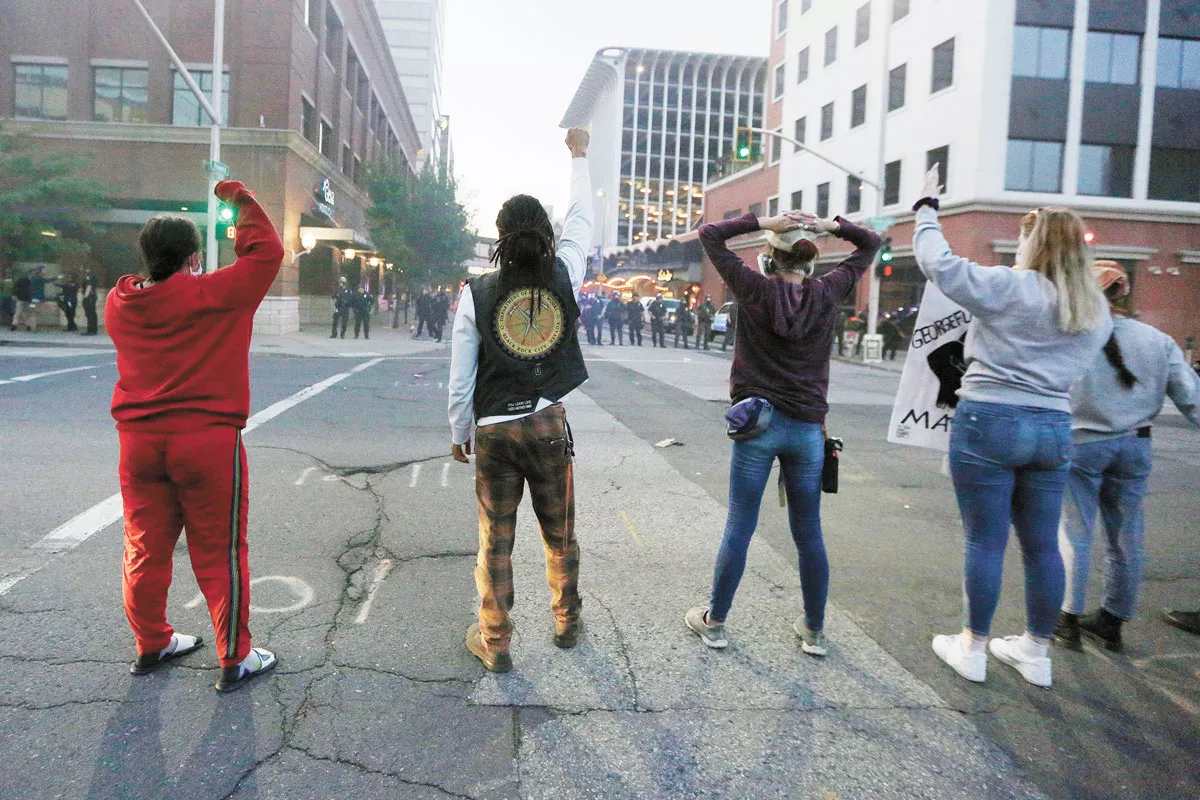
One of the greatest challenges in politics is how to win when most people don't agree with you. Historically, monarchs and dictators have often addressed this rather directly through a combination of propaganda and military force.
This approach has been challenged, to varying degrees of effectiveness, by democracies dating back to the city-state of Athens. These early democracies served to both expand who shared in decision-making and ensure others remained locked out — by defining in slowly increasingly narrow terms who qualified as a citizen.
The founding of the United States was a bold step forward for both expanding and limiting who might count and by how much — quite literally — in a democracy. The founders sought to take power from a monarch and distribute it to all white, landowning men.
Even on those morally compromised terms, it was a radical idea.
Victory was only possible if they stuck together. Or as Ben Franklin observed, "We must all hang together or, most assuredly, we shall all hang separately."
The reality was that to build a new system of power with themselves at the top, they needed to remain united both in challenging England's monarch and in ruling over the population in their newly established democracy.
I don't mean to suggest that all the Founding Fathers were merely power-hungry cynics (although some clearly were). Rather that there was a limit to the application of their idealism. They planted ideological seeds for universal enfranchisement but did not tend to them as faithfully as they ought.
As the right to citizenship and the vote slowly expanded through a combination of self-interest and moral righteousness, new broad agreements began to spread among the electorate. Folks felt that they ought to make a living wage, have access to health care and be able to retire with the comfort of knowing they'd have a roof over their heads.
To be clear, people throughout time have generally wanted these basic human rights. The change was an expansion of self-rule that gave them the hypothetical power to give it to themselves.
Many in the elite — meaning the folks who already had all this stuff and more — didn't love the idea of having to share. But the expanded distribution of political power made the job of keeping it all for themselves a bit more complicated.
This threat to elite, resource-hogging power actually began quite early in our nation's history, as did the elite's "solutions." These "solutions" have become so baked into our culture and politics that it can be easy to take them for granted rather than recognizing them as tools to maintain political power.
There are many, but what they share in common is a "divide and conquer" strategy — encourage the general populace to live in conflict with one another to stop them from uniting against those currently in power.
The two "solutions" of the elite I want to tackle briefly here are racism and partisanship.
Racism is an early political invention to divide a population. Its purpose is not only to suppress Black people and other people of color, but White people outside the elite.
Let me be clear: Racism harms Black people and other people of color the greatest. And it also harms White people. It does this by separating people who share a set of material interests in opposition to an elite.
While the right-wing of modern American politics often tactically fans the flames of racism, the left frequently fails to recognize the actual dynamic at play.
Sure, those on the left see that racism is being used as a campaign tactic, but they are still far too ready to condemn poor and working-class White voters for falling victim to a racist strategy — mocking in crude and cruel terms the folks they should also be trying to help. They feed into a narrative of White vs. Black through "woke" arguments that reinforce racial essentialism by flipping on its head: White people are bad; Black people are good.
Alternatively, they ignore racism and argue for a purely economic critique. But ignoring the tactic that's being used to divide people allows it to fester unchallenged and spread.
Ian Haney López, a professor of public law at Berkeley, has argued for a more effective approach — backed by research — that directly tackles and reveals how racism is being used by the elite to harm all of us, making anti-racism a unifying countermeasure rather than simply joining the more righteous side of a race war.
The tactical nature of partisanship, which has increasingly merged with racism, is perhaps even more evident.
Right-wing anti-government activist Grover Norquist in the early 2000s was repeatedly quoted talking about the need to spread "bitter nastiness and partisanship to state legislatures" across the country — having already succeeded in D.C. in the 1990s.
Why would anyone want to spread "bitter nastiness and partisanship?" The answer is rather straightforward: Because their ideas were and continue to be hugely unpopular. People want to tax the wealthy elite and pay for public education, expanded access to health care, housing, living wages, and other basic human rights.
The elite's solution is to divide people against their own shared interests. Too often the left has fed into this strategy by reinforcing partisan messages and further strengthening this tactic of division.
In this moment, there have been many calls for White people to find solidarity with people of color — and I would echo them. I think solidarity, though, isn't about flipping the power dynamic between various competing groups of working people, but rather a realization of community and common cause.
Recognizing our shared interests is ultimately the tactical response that will defeat racism, partisanship and the other tactics of an increasingly hostile elite. ♦
John T. Reuter, a former Sandpoint city councilman, has been active in protecting the environment, expanding LGBT rights and Idaho's Republican Party politics.
